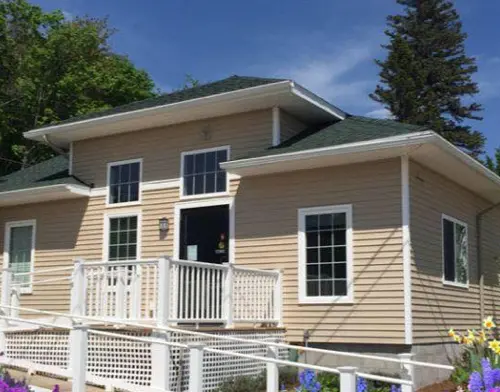About Bear River Health
Bear River Health of Boyne Falls is a substance use and addiction recovery facility located in Northern Michigan alongside U.S. Highway 131. Following the Substance Abuse and Mental Health Services Administration (SAMHSA) protocols, they’re accredited by The Joint Commission and certified with the American Society of Addiction Medicine.
Licensed to Heal in Boyne Falls
Accepting Medicaid and some commercial insurances as well as private pay, they offer multiple paths for your recovery journey. From medically supervised detox to residential and outpatient programs, their 24 hour medical staff also provides medication assisted treatment (MAT). All programs are based on the Hazelden Living in Balance curriculum and include Alcoholics Anonymous (AA) and Narcotics Anonymous (NA).
After a free initial consultation, you’ll be placed into a treatment group composed of other clients and a team of coaches and therapists. As Bear River is a closed campus, no visitors are allowed and incoming mail is screened by the administrative office. There are no phones or devices available while in detox, but after that you’ll be given limited access to electronics during designated recreation times. No day passes are issued, and clients must make a true commitment to recovery without the distractions of everyday life.
After Care Comes Aftercare
The last phase of their gender specific residential program is dedicated to safe discharge planning. Offering resources like peer networks and sober living houses, they’re focused on your aftercare once you leave their facility. If you think you’re in need of their services, they provide an online screening tool to help you take the next step.
If you’re not compatible with their programs, no worries. They’ll refer you to somewhere else where you can get assistance.
Facility Overview
Latest Reviews
We are unaware of any purported situation like this, nor do we have a way to contact you directly. We would very much like to talk to you to learn more, understand, and address any concerns. Please reach out to Tina, our Recipient Rights Officer, by calling 231.535.2822 and select option 1 at the prompt.
Thank you.
Recovery is possible!
Wishing you all the best.
Wishing you all the best!
Rehab Score
Gallery
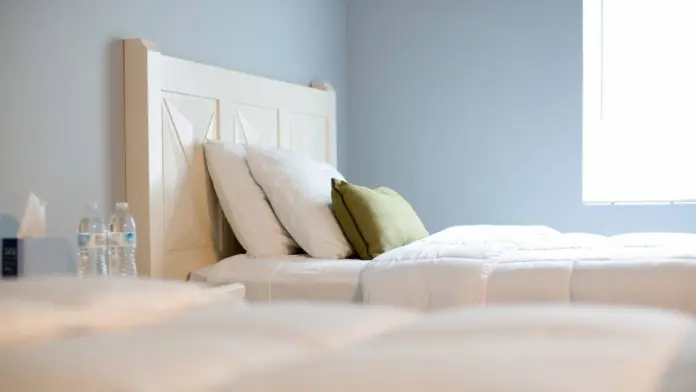
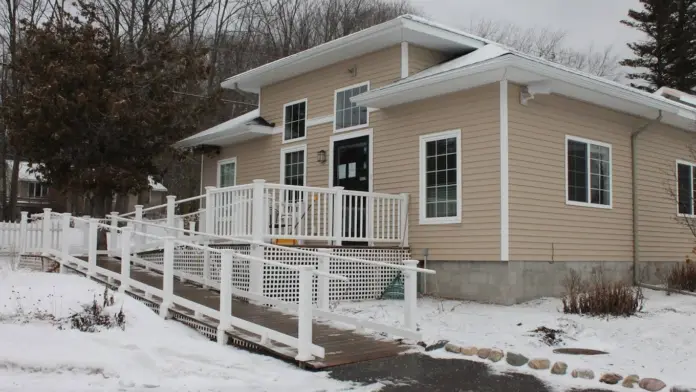
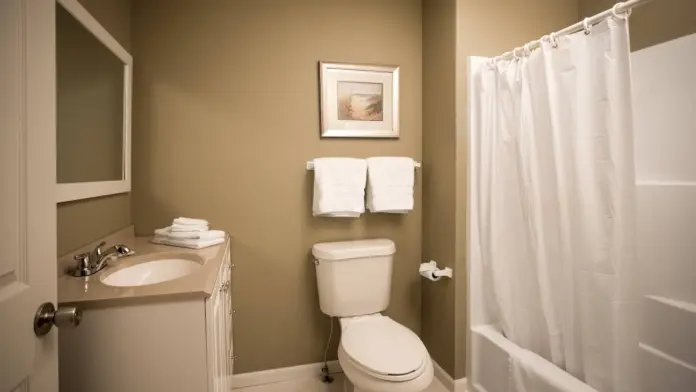
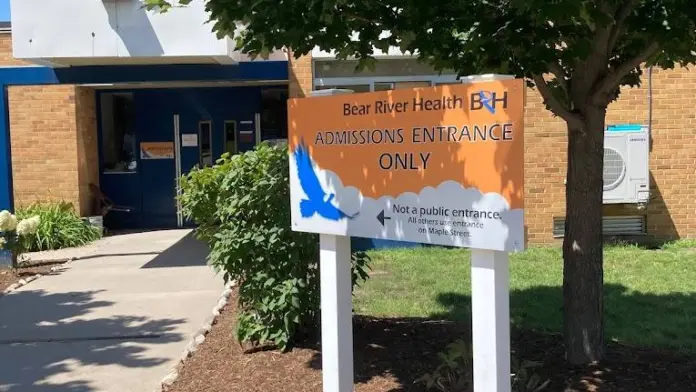
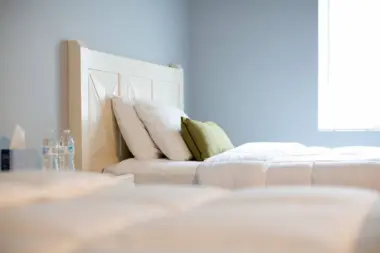
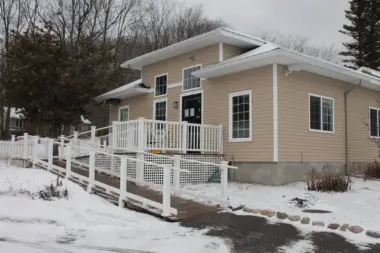
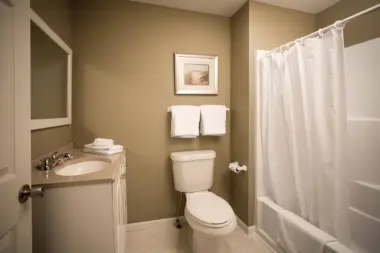
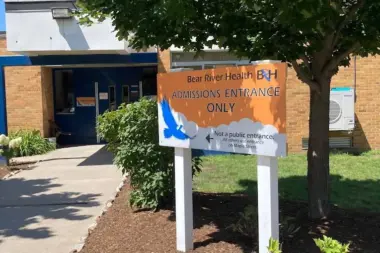
Accepted Insurance
Other Forms of Payment
Self-pay involves paying for treatment out of your own pocket. You can use savings or credit, get a personal loan, or receive help from family and friends to fund your treatment. If you don't have insurance or your insurance plan doesn't cover a specific program, self-pay can help ensure you still get the care you need.
Medicare is a federal program that provides health insurance for those 65 and older. It also serves people under 65 with chronic and disabling health challenges. To use Medicare for addiction treatment you need to find a program that accepts Medicare and is in network with your plan. Out of pocket costs and preauthorization requirements vary, so always check with your provider.
Medicaid is a state based program that helps lower-income individuals and families pay for healthcare. Medicaid covers addiction treatment so those enrolled can use their coverage to pay for rehab. When a program accepts Medicaid the client often pays very little or nothing out of their own pocket.
Military members, veterans, and eligible dependents have access to specific insurance programs that help them get the care they need. TRICARE and VA insurance can help you access low cost or no cost addiction and mental health treatment. Programs that accept military insurance often have targeted treatment focused on the unique challenges military members, veterans, and their families face.
Private insurance refers to any kind of healthcare coverage that isn't from the state or federal government. This includes individual and family plans offered by an employer or purchased from the Insurance Marketplace. Every plan will have different requirements and out of pocket costs so be sure to get the full details before you start treatment.
Addiction Treatments
Levels of Care
Outpatient Programs (OP) are for those seeking mental rehab or drug rehab, but who also stay at home every night. The main difference between outpatient treatment (OP) and intensive outpatient treatment (IOP) lies in the amount of hours the patient spends at the facility. Most of the time an outpatient program is designed for someone who has completed an inpatient stay and is looking to continue their growth in recovery. Outpatient is not meant to be the starting point, it is commonly referred to as aftercare.
Residential treatment programs are those that offer housing and meals in addition to substance abuse treatment. Rehab facilities that offer residential treatment allow patients to focus solely on recovery, in an environment totally separate from their lives. Some rehab centers specialize in short-term residential treatment (a few days to a week or two), while others solely provide treatment on a long-term basis (several weeks to months). Some offer both, and tailor treatment to the patient's individual requirements.
Sober living homes in Michigan act as a bridge between an intensive level of care and the freedom of independent living. The primary rule in every sober living home is to stay sober. If a resident breaks this rule, they can be evicted. However, this environment is designed to prevent relapse, with mutual support, 12-step meetings, a structured schedule, and drug screenings.
At certain points in the recovery process, it's important to have support available 24/7. 24-hour clinical care offers a safe environment in which to recover from drug or alcohol addiction in peace, knowing medical detox and other treatment will happen with professionals on hand.
Detoxification from alcohol, cocaine, heroin, and prescription drugs all require specialized medical expertise. Medications are used to ensure a safe and tolerable withdrawal and prevent many potential complications that are painful and life threatening. Detoxification is just the start on the road to Recovery. Bear River Health’s Residential and Outpatient Treatment services are the next steps to ensure long-term Recovery.
Treatments
The goal of treatment for alcoholism is abstinence. Those with poor social support, poor motivation, or psychiatric disorders tend to relapse within a few years of treatment. For these people, success is measured by longer periods of abstinence, reduced use of alcohol, better health, and improved social functioning. Recovery and Maintenance are usually based on 12 step programs and AA meetings.
Drug rehab in Michigan provides personalized treatment to help individuals break this cycle and regain control of their lives. Treatment methods are used in various levels of care, including inpatient rehab, partial hospitalization programs, intensive outpatient programs, and standard outpatient treatment.
Many of those suffering from addiction also suffer from mental or emotional illnesses like schizophrenia, bipolar disorder, depression, or anxiety disorders. Rehab and other substance abuse facilities treating those with a dual diagnosis or co-occurring disorder administer psychiatric treatment to address the person's mental health issue in addition to drug and alcohol rehabilitation.
A combined mental health and substance abuse rehab has the staff and resources available to handle individuals with both mental health and substance abuse issues. It can be challenging to determine where a specific symptom stems from (a mental health issue or an issue related to substance abuse), so mental health and substance abuse professionals are helpful in detangling symptoms and keeping treatment on track.
Opioid rehabs specialize in supporting those recovering from opioid addiction. They treat those suffering from addiction to illegal opioids like heroin, as well as prescription drugs like oxycodone. These centers typically combine both physical as well as mental and emotional support to help stop addiction. Physical support often includes medical detox and subsequent medical support (including medication), and mental support includes in-depth therapy to address the underlying causes of addiction.
Programs
Men face specific challenges and concerns when seeking addiction treatment. Gender-specific recovery programs help them tackle these issues head-on in an environment that's focused, targeted, and distraction-free. It also gives them the opportunity to connect with and learn from other men who have been through a similar journey and can offer support for the next step.
Rehabs for women provide a safe, nurturing space for female clients to heal. These treatment programs consider the specific obstacles that women can face during recovery and place a special emphasis on mental, social, physical, and reproductive health. They explore how each woman's experience has shaped the trajectory of their substance use, addressing issues such as sexual abuse and past trauma.
Adult rehab programs include therapies tailored to each client's specific needs, goals, and recovery progress. They are tailored to the specific challenges adult clients may face, including family and work pressures and commitments. From inpatient and residential treatment to various levels of outpatient services, there are many options available. Some facilities also help adults work through co-occurring conditions, like anxiety, that can accompany addiction.
Clinical Services
Cognitive behavioral therapy in Michigan helps participants view challenges more clearly so they can respond to them in healthy ways. During a limited number of structured sessions, clients learn about and practice these changes to effectively address substance use and mental health disorders.
Addiction often involves intense situations and emotions. Dialectical behavior therapy helps you understand and regulate your emotions and better manage the situations that evoke those feelings. You'll receive mindfulness training and stress management training to cope more effectively with difficult emotions.
Group therapy sessions in Michigan allow you to share responsibility with your peers in a group setting. This fosters a collective commitment to achieve sobriety and learn coping skills that are essential to improving your relationships and reducing your stress levels.
Personalized therapy sessions for drug addiction emphasize understanding your background and behavioral triggers for substance use. Your therapist will collaborate with you to create an effective coping strategy and address underlying issues that clear the way for lasting change.
Amenities
-
Private Setting
-
Yoga Studio
-
Wifi
-
Private Transportation
-
Private Rooms
-
Residential Setting
Staff & Accreditations
Staff
Cathy Bond
Chief of Staff
Jason E. Sweeney, JD
Chief Compliance Officer
Jackie Guzman, RMA
Chief Operating Officer
Chris Frasz, LLMSW, CAADC
Chief Clinical Outreach Officer
Thomas Hartman
Chief Information & Technology Officer
Accreditations

The Joint Commission, formerly known as JCAHO, is a nonprofit organization that accredits rehab organizations and programs. Founded in 1951, the Joint Commision's mission is to improve the quality of patient care and demonstrating the quality of patient care.
Joint Commission Accreditation: Yes
Accreditation Number: 579501

The Substance Abuse and Mental Health Services Administration (SAMHSA) is a branch of the U.S. Department of Health and Human Services. Established in 1992 by congress, SAMHSA's mission is to reduce the impact of substance abuse and mental illness on American's communities.
SAMHSA Listed: Yes
Contact Information
2329 Center St
Boyne Falls MI, 49713
